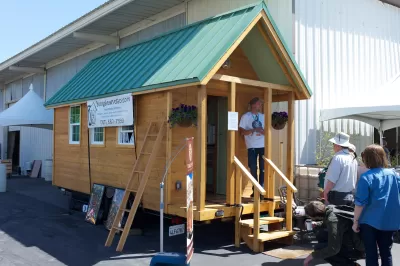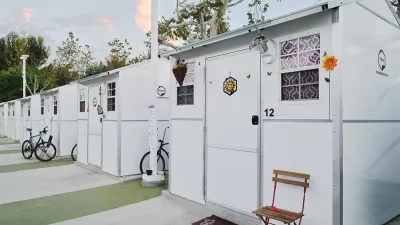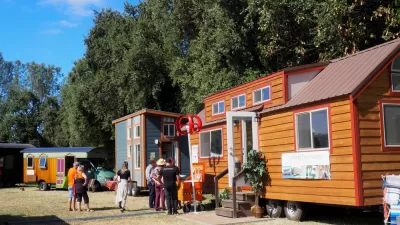Meant to serve chronically homeless people, the Licton Springs tiny house village has been controversial from the start. It's uncertain whether enough permanent housing exists to resettle all residents.

Seattle is one of several cities experimenting with tiny houses as a means to address chronic homelessness. This is the first time the city's phasing out one of its tiny house sites, which are meant to serve as transitional housing. Kate Walters writes, "The Licton Springs site opened on Aurora Avenue North in 2017 and was controversial from the get-go. Unlike most other villages and shelters in the city, alcohol and drug use are allowed at the Licton Springs site."
Nearby residents have associated the site with a noticeable increase in crime. But for those who've benefitted from the tiny houses, the future is now very uncertain. Service providers say that a lack of affordable housing makes it difficult to transfer residents into permanent dwellings. "Only 33 people were moved from tiny house villages across Seattle into permanent housing in the first six months of 2018. The number of tiny house villages has gone up this year, but the rate at which people are leaving for housing has gone down by 5 percent over the same time last year."
Meanwhile, Seattle appears to have learned something from the case. Namely, that a more hands-on approach is advisable. "City officials say lessons have been learned from the Licton Springs site, including that participation in case management and housing searches should be required."
FULL STORY: 'I'm scared.' Residents react to tiny house closures in north Seattle

Maui's Vacation Rental Debate Turns Ugly
Verbal attacks, misinformation campaigns and fistfights plague a high-stakes debate to convert thousands of vacation rentals into long-term housing.

Planetizen Federal Action Tracker
A weekly monitor of how Trump’s orders and actions are impacting planners and planning in America.

Chicago’s Ghost Rails
Just beneath the surface of the modern city lie the remnants of its expansive early 20th-century streetcar system.

Bend, Oregon Zoning Reforms Prioritize Small-Scale Housing
The city altered its zoning code to allow multi-family housing and eliminated parking mandates citywide.

Amtrak Cutting Jobs, Funding to High-Speed Rail
The agency plans to cut 10 percent of its workforce and has confirmed it will not fund new high-speed rail projects.

LA Denies Basic Services to Unhoused Residents
The city has repeatedly failed to respond to requests for trash pickup at encampment sites, and eliminated a program that provided mobile showers and toilets.
Urban Design for Planners 1: Software Tools
This six-course series explores essential urban design concepts using open source software and equips planners with the tools they need to participate fully in the urban design process.
Planning for Universal Design
Learn the tools for implementing Universal Design in planning regulations.
planning NEXT
Appalachian Highlands Housing Partners
Mpact (founded as Rail~Volution)
City of Camden Redevelopment Agency
City of Astoria
City of Portland
City of Laramie





























